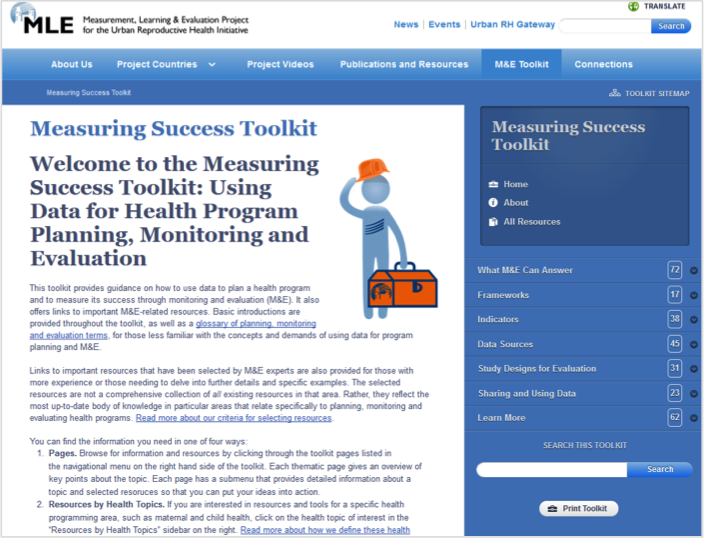I am Elizabeth Tully the Online Toolkit Manager at the Johns Hopkins Bloomberg School of Public Health’s Center for Communication Programs (JHU?CCP). One of the toolkits that I work on regularly is the Measurement, Learning & Evaluation (MLE) Project‘s Measuring Success Toolkit. This toolkit provides guidance on how to use data to plan a health program and to measure its success through monitoring and evaluation (M&E). Using data to design and implement health programs leads to more successful and impactful programs. Data can be used to solve health programming-related problems, inform new program design, assess program effectiveness and efficiency, and suggest evidence-based adaptations and improvements.
But this post is especially about the importance of designing useful resources for M&E practitioners – and the Measuring Success Toolkit is Rad!
Hot Tip #1: Using the Toolkit. The Toolkit is meant to be used! It offers full text documents and usable tools that are in the form of an uploaded file that a user can download or a hyperlink to another website’s rad resources. It is organized both by steps in an M&E plan and by health topic. A handy Toolkit tutorial video is also available to assist new users in navigating the Measuring Success Toolkit.
Hot Tip #2: Curated Content Focuses on Use. The Measuring Success Toolkit team updates the toolkit with useful resources every quarter! This means that the content is curated by M&E experts and includes guides, checklists, protocols, indicators and other tools that can be used by M&E practitioners in the field. While you won’t find peer reviewed journal articles or lengthy end of project reports in this toolkit, you will find the tools and resources to help you plan for, monitor and evaluate a program that would be worthy of an esteemed journal. You’ll certainly be prepared to document your project’s success!
Rad Resources: Within the toolkit you’ll find plenty of great tools – 160 and counting! Here’s a quick list of our most popular (and most downloaded) resources on the site:
Qualitative Research Methods: A Data Collector’s Field Guide
A Guide for Developing a Logical Framework
Please send suggestions for resources to include to contactus@urbanreproductivehealth.org. Our next update will be in mid-October!
Do you have questions, concerns, kudos, or content to extend this aea365 contribution? Please add them in the comments section for this post on the aea365 webpage so that we may enrich our community of practice. Would you like to submit an aea365 Tip? Please send a note of interest to aea365@eval.org . aea365 is sponsored by the American Evaluation Association and provides a Tip-a-Day by and for evaluators.

Thanks for Sharing Elizebeth. I took a look at the site, and didn’t see anything around developmental evaluation. Have you ever consider adding resources related to DE? Just a thought.